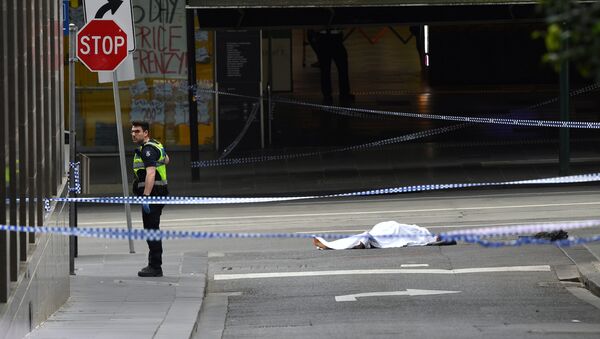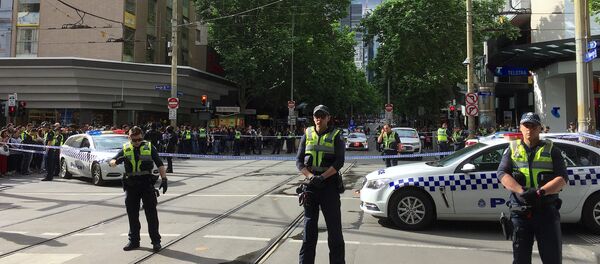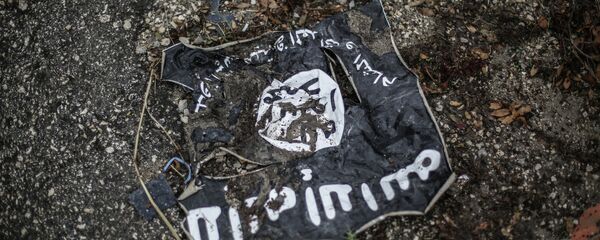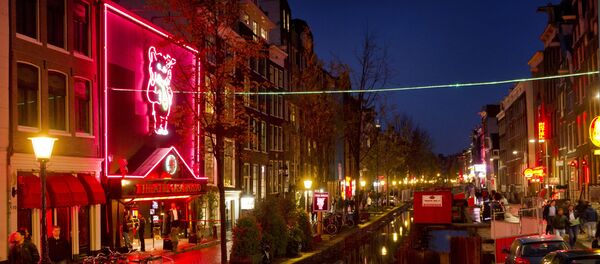Sputnik has discussed the terrorist incident in Melbourne with Dr Clarke Jones, Director of the Australian Intervention Support Hub and terrorism and radicalization expert.
Sputnik: We always have to discuss these very unfortunate incident that results in death and injury to people, let's focus on this specific Melbourne attack, what prompted it in your opinion?
Dr Clarke Jones: I think it's starting to pan out as a mental health issue. The man, the culprit was claiming that he's being chased by someone with spears. So going back in history he appeared to be under the watch by police, but even some of his neighbours said he was a normal functioning individual. So what we want to look at is at what's tipped him over the edge and what's led to these mental health conditions.
Yes, it's been claimed as a terrorist act and it clearly has signs of that but it would be interesting to wait for the investigations to take place and to see what's happened, but it appears to be a mental health situation.
READ MORE: Australian Muslims Furious Over PM Slamming Radical Islam After Melbourne Attack
Sputnik: And yet apparently his passport revoked three years ago allegedly for intention to join ISIS [Daesh*], surely that was something that would've brought up some red flags?
Dr Clarke Jones: That's right. This is what I'm interested in, in a sense that we spend a lot of time in developing intervention programmes, some would say de-radicalization programmes and we work very closely with Muslim communities in Melbourne and Sydney.
Now I want to know why, if they were concerned about him, why wasn't some sort of preventative action taken rather than whether he's on and off the radar or whether he's a threat or not a threat to national security. I think this is a situation where some sort of preventative strategy should've been implemented.
READ MORE: Australian Discrimination Chief to Slam Senator for Muslim Migration Initiative
Sputnik: I'm sure that there is kind of a two-pronged approach, on the one hand, monitoring people with mental health issues because they can be fine for years and then something just sets them off and there's, of course, the Islamic State activity online — that's another thing that tends to draw people like that, maybe even just angry people, right?
Now that wasn't called a terrorist act but there was also a mental health situation behind it. Now getting again back to your point, I think there are many, many issues and sometimes people of minority background can feel that they don't belong. There can be feelings of isolation or marginalization, there can be something within the family, there could be parent problems, there could be family dysfunction, it could've been something in a workplace where racism or in this case maybe islamophobia was behind the final straw, where he could no longer cope.
But if you think about that he did try and go to Syria some three years ago, I think if I get back to my point before, if he has been on the radar then really why wasn't some of these underlying issues addressed, whether it would be through a community programme or whether it would be one of the programmes that the government runs.
READ MORE: Top Four Most Recent Knife Attacks in Australia
Sputnik: Going back to addressing problems of radicalization Prime Minister Scott Morrison called on religious leaders to be proactive addressing the problem of radicalisation, he urged them to protect their communities because, of course, the communities should be involved more to ensure that dangerous ideology teachings do not spread in Australia, is this working?
Dr Clarke Jones: I think they're famous last words. I've seen the government trying to fund all sorts of programs, but I've seen communities that really need the money to work on these issues not get funding, so I think the funding is not really reaching the right areas. I also question calling on Muslim leaders to take responsibility for this, if you are a Muslim leader or someone from the Muslim community that is highly offensive, that's like saying if the drug problem or the ice problem belongs to the white Anglo Saxon population we're literally calling on the white Anglo Saxon leaders to address the ice issue, it's ludicrous, I think the responsibility also needs to go back onto the majority and also back onto the government.
Sputnik: Do you see this Melbourne attack leading to tougher scrutiny of Daesh sympathizers in Australia?
Dr Clarke Jones: I have no problem with legislation that tries to crack down on whether it's online or those people who are trying to recruit people into the Islamic State. I have no issue; no one wants that, none of my colleagues in the Muslim community wants that, no one really wants that. The government needs to take this very, very seriously as it played out yesterday (Friday), but we have to be very tactful in how we do this. it is not just about security in Australia, there are many, many approaches we can take to this, if we over securitize the problem I think that ends up compounding the problem and we will end up seeing more terrorist acts in Australia.
READ MORE: Two People Injured in London Stabbing Incident, Suspect Arrested — Police
Sputnik: Of course Australian does have some of the toughest anti-terror laws but the opinion is out there that the government is doing not enough to prevent extremism at the community level, would you agree with this?
Dr Clarke Jones: Yes, I couldn't agree more, and half of my work is spent working with Muslim communities and I was making a point before that there is funding that goes to certain communities but I don't think the government really wants to grapple the real issue. Some of the communities that I work with are very conservative even from the Salafist background and it's really the Salafi community that gets blamed for everything.
Views and opinions, expressed in the article are those of Dr Clarke Jones and do not necessarily reflect those of Sputnik.
*Daesh, also known as IS, ISIS, ISIL, Islamic State, is a terrorist group, banned in Russia.





